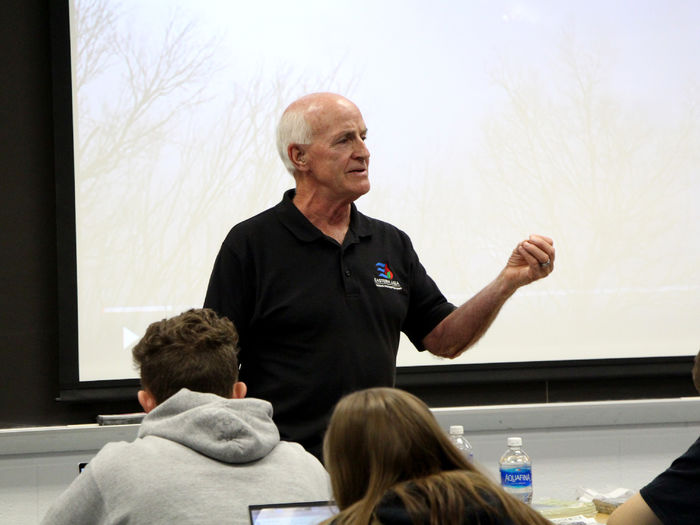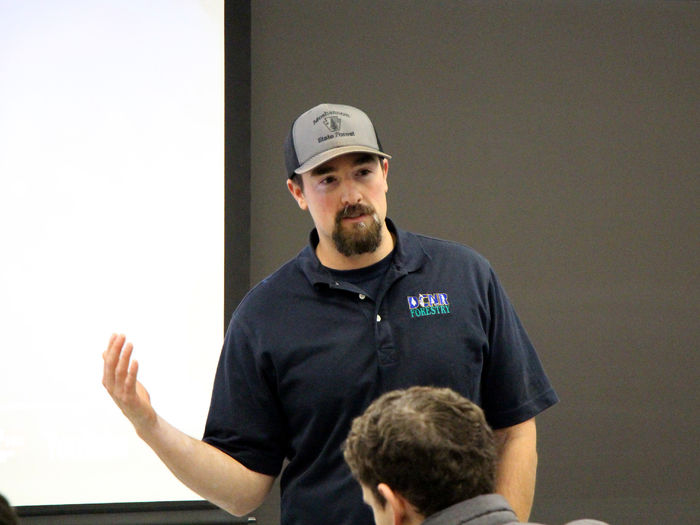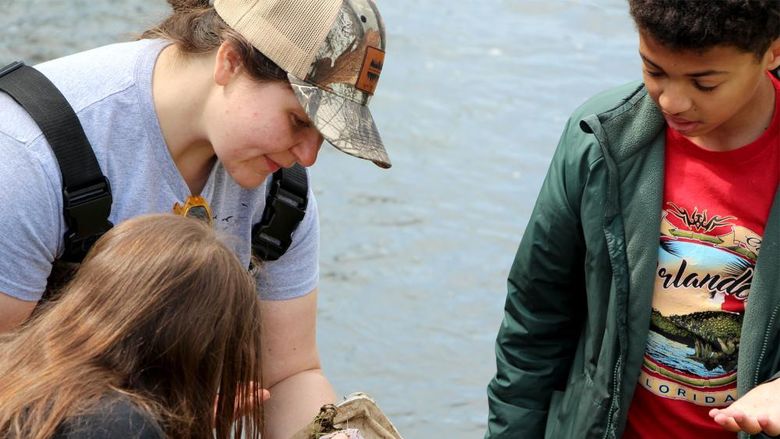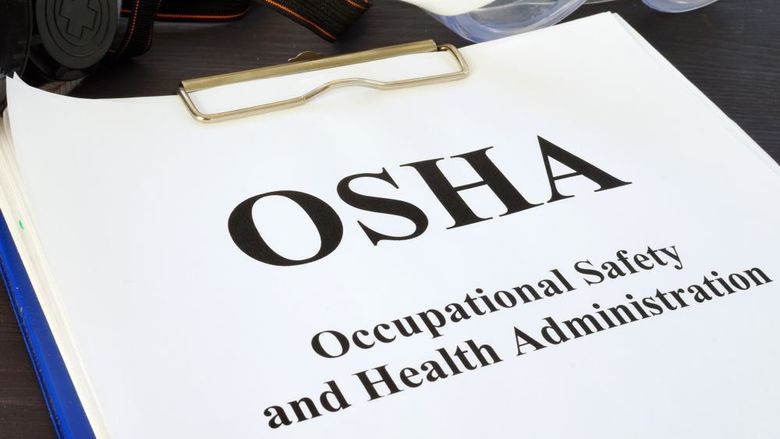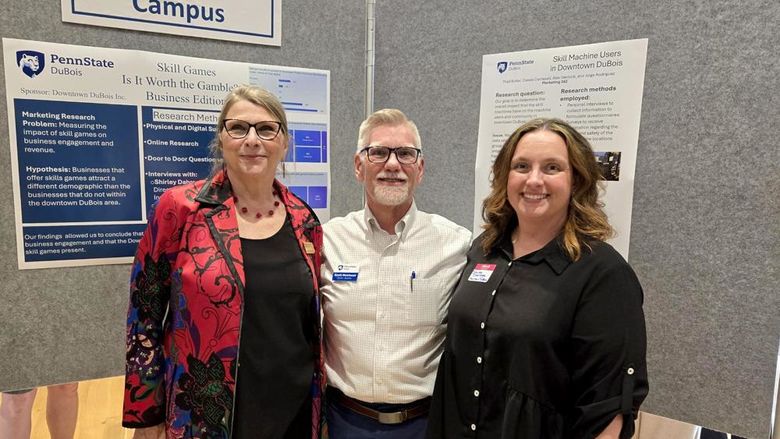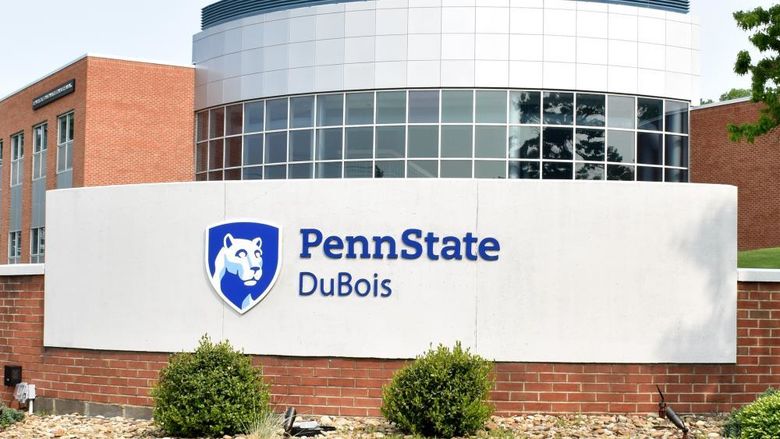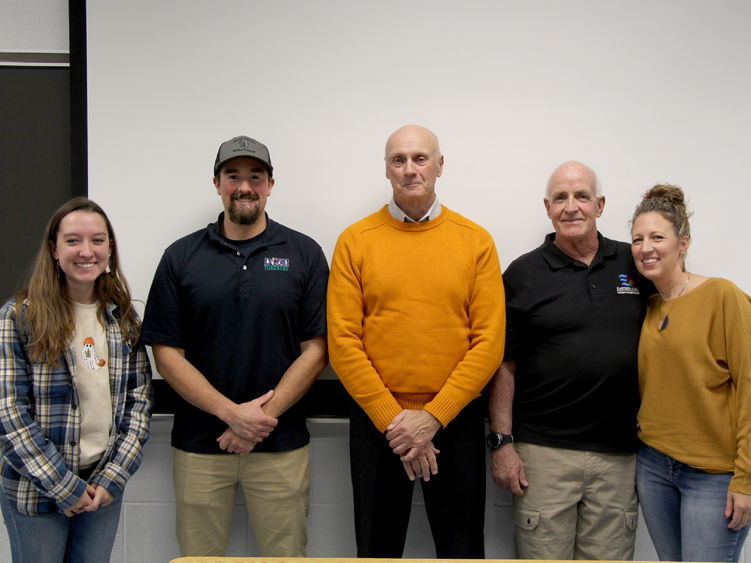
Individuals involved in the wildfire presentation at Penn State DuBois. From left to right: Justice Williams, Cody Gulvas, Fred Groh, Larry Bickel and Stefanie Williams.
DuBOIS, Pa. — Students in the course EARTH 104N: Climate, Energy and Our Future at Penn State DuBois recently received a presentation from two industry experts on forest fires. The presentation not only covered how fires are fought and how they often start, but also what is being done to prevent them from happening and how some communities are coming together to make their area safer.
Currently, the class is studying wildfires and their impacts, including how they occur, why they occur and how climate change has played a role in wildfire frequency and severity. Students have been divided into groups and each group has selected a wildfire in the United States to study. Groups are focusing on the impacts the wildfires had on the communities they took place in; what, if any, crimes took place as part of the wildfire; if the fire had any impacts on families in the area; what impact the weather had on the fire; and what fueled the fire itself.
Cody Gulvas, a fire forester for the Pennsylvania Department of Conservation and Natural Resources (DCNR), and Larry Bickel, a retired DCNR employee who now uses his knowledge of forest fires on a national level as part of a national forest fire fighting and education group, shared information with students about their personal backgrounds, including education they have received and how their professional experiences have developed, as well as what they do today in their current positions.
Bickel, as part of his current position, has traveled all over the country fighting fires and helping individuals by educating them how they can make their homes and their communities safer. He also shared his experiences fighting fires in numerous states outside of Pennsylvania, sharing forest fire maps for fires in Oregon, Utah and several other locations.
“I’ve had my foot in both oceans fighting fires,” Bickel said. “That’s pretty amazing. I really have a passion for this.”
As a fire forester, Gulvas responds to every wildfire in parts of three different counties in Pennsylvania. He works with local officials there and does a complete investigation into each fire, including the starting point of the fire and how each fire began. He shared with the class some of the experiences he has seen in recent fires and noted that forest fires are on the rise in the state. Gulvas has found there have been several causes of the increase in our area, including insect infestations, invasive species and climate change.
“Everyone always talks about western fires in the United States,” Gulvas said. “Pennsylvania tends to get overlooked. But with all the different insects and dieback from some of the tress we have around here, we have the potential for some big fires. We are seeing them more and more every year. This past spring, I had a 1,500-acre wildfire right here in our area. We want to keep people informed and educated because that’s one of the best forms of prevention we have.”
One of the topics that was covered was a program that is used not only to educate people on safety from wildfires in an individual home, but for an entire community. Both Bickel and Gulvas have been involved with the Firewise Communities program in the area, with Bickel spearheading the program at the start. The Firewise Communities program is a recognition program from Firewise USA that provides a collaborative framework to help members of a community in a geographic area get organized, find direction and take action to increase the ignition resistance of their homes and community. The goal is to reduce wildfire risks at the local level.
The Firewise USA program is administered by the National Fire Protection Association (NFPA). According to the Firewise USA website, there are currently three communities in Pennsylvania that have achieved Firewise Community status. One of those communities is Treasure Lake, a semi-private, gated community in Sandy Township. The main entrance to Treasure Lake is approximately four miles from the Penn State DuBois campus.
Bringing Bickel and Gulvas to the class was a collaborative effort of Fred Groh, adjunct lecturer in earth sciences, and one of the students in his class, Justice Williams, fourth year business student who is also studying an entrepreneurship minor. When the course started covering wildfires, Williams informed Groh that a family friend of her mother works with an agency that fights wildfires. Williams assisted Groh with contacting Bickel and Gulvas to bring them to speak to the class.
